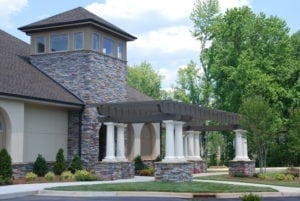Stone is a beautiful building material, but it is expensive, difficult to transport, heavy to handle, and it requires very specific construction stonemason skills to cut and lay. Manufactured stone on the other hand is considerably cheaper, lighter, a lot easier to install, and it is more readily available than natural stone. Better still, it is available in a wide range of finishes and styles that look exactly like different types of natural stone.
 Another of the most valuable benefits of manufactured vs natural stone is that it can be used internally to revamp surfaces without the mess associated with stonework.
Another of the most valuable benefits of manufactured vs natural stone is that it can be used internally to revamp surfaces without the mess associated with stonework.
Additionally, because manufactured stone is available in architectural grade stone, professional companies that offer building and renovating services prefer it because they are able to provide a more reliable, quality service for a lower price.
Availability of Manufactured vs Natural Stone
Natural stone is quarried and varies according to what occurs naturally in different states. So you will find that sandstone is common in some areas, while flint, shale, quartz or granite is more common elsewhere.
Natural stone is also cut in different ways, to form large blocks or pieces that can be roughly stacked. River rocks, found in riverbeds and valleys, is generally rounded – because it has been washed by water over time – and is found in many colors and shapes. So too is field stone, though it is more textured and unevenly worn that river rock.
Ultimately, if you are opting for natural stone, you will need to use what is found on your own land (if you are lucky enough to own property large enough to have sufficient natural stone for building), or in local quarries. Some construction outlets supply stone, but local availability will link closely to price.
If you – or your contractor – are going to bring in natural stone from other areas, this will inevitably increase your costs.
Manufactured stone, on the other hand, relies solely on the types, styles, and colors created by the manufacturer. These may be cast in fine-aggregate concrete using a mold, or formed in some other material. Generally, it can be made to imitate any form of natural stone.
Georgia-based Native Custom Stone has a range of relatively conventional cast-stone products in a wide range of styles and finishes. The company also produces innovative manufactured stone panels made primarily from recycled rubber tires. All are available from BuildDirect.com, select Home Depot stores or online from www.homedepot.com. Whichever type of manufactured stone you choose, there will be no quarries and no dirty work for you or your contractor.
Versatility of Manufactured vs Natural Stone
Manufactured stone is considerably more versatile than natural stone, and a lot easier to use. For example, once you have a basic structure, be it a house or a freestanding wall, you can use manufactured stone veneer to completely change the finish and look of your home, or part of it. This means that it is also suitable for initial construction as well as for renovations.
While both natural and manufactured stone may be used inside the house and outside, natural stone isn’t an easy option for renovations, unless they incorporate additions that involve new walls.
Installation Techniques of Manufactured vs Natural Stone
The installation techniques of manufactured stone are much simpler than the construction methods required to lay natural stone. For instance natural stone must be laid on a solid concrete foundation and cutting of the stone can be a challenge.
While most cast faux stone should be laid with mortar, the reduced weight of the units makes them easier to handle than natural stone blocks. Native Custom Stone’s Go-Stone panels are even easier to work with as they are laid using tile adhesive, so no mortar is required.
If you’d like to know more about the benefits of manufactured vs natural stone, contact Native Custom Stone.
Native Custom Stone – Natural vs. Manufactured Stone (weight heavy in pros favoring manufactured), ROI using manufactured stone



Follow Us!